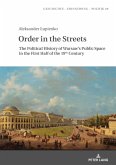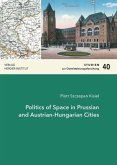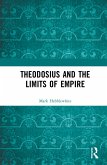Susanne Rau
History, Space and Place
Susanne Rau
History, Space and Place
- Gebundenes Buch
- Merkliste
- Auf die Merkliste
- Bewerten Bewerten
- Teilen
- Produkt teilen
- Produkterinnerung
- Produkterinnerung
Susanne Rau provides a survey of the history of Western concepts of space and opens up interdisciplinary approaches to the phenomenon of space in fields ranging from physics to philosophy.
Andere Kunden interessierten sich auch für
![Hitler and Mussolini in Churches Hitler and Mussolini in Churches]() Egon PelikanHitler and Mussolini in Churches75,40 €
Egon PelikanHitler and Mussolini in Churches75,40 €![Visual Sociology Visual Sociology]() Douglas HarperVisual Sociology175,99 €
Douglas HarperVisual Sociology175,99 €![Order in the Streets Order in the Streets]() Aleksander LupienkoOrder in the Streets71,30 €
Aleksander LupienkoOrder in the Streets71,30 €![Politics of Space in Prussian and Austrian-Hungarian Cities Politics of Space in Prussian and Austrian-Hungarian Cities]() Piotr Szczepan KisielPolitics of Space in Prussian and Austrian-Hungarian Cities43,00 €
Piotr Szczepan KisielPolitics of Space in Prussian and Austrian-Hungarian Cities43,00 €![Nations and Nationalism in World History Nations and Nationalism in World History]() Steven GrosbyNations and Nationalism in World History195,99 €
Steven GrosbyNations and Nationalism in World History195,99 €![Sulla Sulla]() Arthur KeaveneySulla195,99 €
Arthur KeaveneySulla195,99 €![Theodosius and the Limits of Empire Theodosius and the Limits of Empire]() Mark HebblewhiteTheodosius and the Limits of Empire195,99 €
Mark HebblewhiteTheodosius and the Limits of Empire195,99 €-
-
-
Susanne Rau provides a survey of the history of Western concepts of space and opens up interdisciplinary approaches to the phenomenon of space in fields ranging from physics to philosophy.
Hinweis: Dieser Artikel kann nur an eine deutsche Lieferadresse ausgeliefert werden.
Hinweis: Dieser Artikel kann nur an eine deutsche Lieferadresse ausgeliefert werden.
Produktdetails
- Produktdetails
- Verlag: Routledge
- Seitenzahl: 234
- Erscheinungstermin: 18. März 2019
- Englisch
- Abmessung: 240mm x 161mm x 17mm
- Gewicht: 520g
- ISBN-13: 9781138742215
- ISBN-10: 113874221X
- Artikelnr.: 56876111
- Herstellerkennzeichnung
- Libri GmbH
- Europaallee 1
- 36244 Bad Hersfeld
- gpsr@libri.de
- Verlag: Routledge
- Seitenzahl: 234
- Erscheinungstermin: 18. März 2019
- Englisch
- Abmessung: 240mm x 161mm x 17mm
- Gewicht: 520g
- ISBN-13: 9781138742215
- ISBN-10: 113874221X
- Artikelnr.: 56876111
- Herstellerkennzeichnung
- Libri GmbH
- Europaallee 1
- 36244 Bad Hersfeld
- gpsr@libri.de
Susanne Rau is professor of spatial history and culture at the University of Erfurt, Germany, and distinguished visiting professor at the École normale supérieure de Lyon, France. Michael Thomas Taylor works as a translator in Berlin. From 2007 to 2012 he taught as assistant professor of German at the University of Calgary (Canada), and from 2012 to 2017 as assistant, then associate professor of German and humanities at Reed College in Portland, Oregon (USA).
Acknowledgements
What Is Historical Research into Space? An Introduction
1. Historical and Systematic Approach
1.1. Prehistory
On the History of Western Concepts of Space
Space: On the German History of a Concept
Alternative Paths: Febvre-Braudel-Lefebvre
1.2 Concepts
Everyday and Scholarly Concepts of Space: Not a Contradiction
Conceptual History
Analytical Concepts
2. Disciplinary Approaches
2.1 Geography
2.2 Cultural Anthropology, Postcolonial Studies
2.3 Sociology
2.4 Spaces and Spatialities as a New Historiographical Topic
3. Spatial Analysis
3.1 Spatial Constitution and Configurations
Macrohistorical Processes
Spatial Types, Spatial Formations
Guiding Differences for Analysis
Global Spaces: Spatial Transformations in the Course of Processes of
Globalization
The City: A Changing Spatial Configuration
Trade: Interactive Relationships That Create Spaces
3.2 Spatial Dynamics: Emergence-Transformation-Dissolution
3.3 The Subjective Construction of Spaces
Perceptions-Memories-Representations
Spaces of Imagination and Other Spaces
Spatial Stories-Spatial Media-Mental Maps
3.4 Spatial Practices-Uses of Space
4. Conclusion and Outlook
5. Appendix of Sources for the Historical Study of Space
Selected Bibliography
Glossary
Acknowledgments
Afterword to the Second Edition
Index of Persons and Topics
What Is Historical Research into Space? An Introduction
1. Historical and Systematic Approach
1.1. Prehistory
On the History of Western Concepts of Space
Space: On the German History of a Concept
Alternative Paths: Febvre-Braudel-Lefebvre
1.2 Concepts
Everyday and Scholarly Concepts of Space: Not a Contradiction
Conceptual History
Analytical Concepts
2. Disciplinary Approaches
2.1 Geography
2.2 Cultural Anthropology, Postcolonial Studies
2.3 Sociology
2.4 Spaces and Spatialities as a New Historiographical Topic
3. Spatial Analysis
3.1 Spatial Constitution and Configurations
Macrohistorical Processes
Spatial Types, Spatial Formations
Guiding Differences for Analysis
Global Spaces: Spatial Transformations in the Course of Processes of
Globalization
The City: A Changing Spatial Configuration
Trade: Interactive Relationships That Create Spaces
3.2 Spatial Dynamics: Emergence-Transformation-Dissolution
3.3 The Subjective Construction of Spaces
Perceptions-Memories-Representations
Spaces of Imagination and Other Spaces
Spatial Stories-Spatial Media-Mental Maps
3.4 Spatial Practices-Uses of Space
4. Conclusion and Outlook
5. Appendix of Sources for the Historical Study of Space
Selected Bibliography
Glossary
Acknowledgments
Afterword to the Second Edition
Index of Persons and Topics
Acknowledgements
What Is Historical Research into Space? An Introduction
1. Historical and Systematic Approach
1.1. Prehistory
On the History of Western Concepts of Space
Space: On the German History of a Concept
Alternative Paths: Febvre-Braudel-Lefebvre
1.2 Concepts
Everyday and Scholarly Concepts of Space: Not a Contradiction
Conceptual History
Analytical Concepts
2. Disciplinary Approaches
2.1 Geography
2.2 Cultural Anthropology, Postcolonial Studies
2.3 Sociology
2.4 Spaces and Spatialities as a New Historiographical Topic
3. Spatial Analysis
3.1 Spatial Constitution and Configurations
Macrohistorical Processes
Spatial Types, Spatial Formations
Guiding Differences for Analysis
Global Spaces: Spatial Transformations in the Course of Processes of Globalization
The City: A Changing Spatial Configuration
Trade: Interactive Relationships That Create Spaces
3.2 Spatial Dynamics: Emergence-Transformation-Dissolution
3.3 The Subjective Construction of Spaces
Perceptions-Memories-Representations
Spaces of Imagination and Other Spaces
Spatial Stories-Spatial Media-Mental Maps
3.4 Spatial Practices-Uses of Space
4. Conclusion and Outlook
5. Appendix of Sources for the Historical Study of Space
Selected Bibliography
Glossary
Acknowledgments
Afterword to the Second Edition
Index of Persons and Topics
What Is Historical Research into Space? An Introduction
1. Historical and Systematic Approach
1.1. Prehistory
On the History of Western Concepts of Space
Space: On the German History of a Concept
Alternative Paths: Febvre-Braudel-Lefebvre
1.2 Concepts
Everyday and Scholarly Concepts of Space: Not a Contradiction
Conceptual History
Analytical Concepts
2. Disciplinary Approaches
2.1 Geography
2.2 Cultural Anthropology, Postcolonial Studies
2.3 Sociology
2.4 Spaces and Spatialities as a New Historiographical Topic
3. Spatial Analysis
3.1 Spatial Constitution and Configurations
Macrohistorical Processes
Spatial Types, Spatial Formations
Guiding Differences for Analysis
Global Spaces: Spatial Transformations in the Course of Processes of Globalization
The City: A Changing Spatial Configuration
Trade: Interactive Relationships That Create Spaces
3.2 Spatial Dynamics: Emergence-Transformation-Dissolution
3.3 The Subjective Construction of Spaces
Perceptions-Memories-Representations
Spaces of Imagination and Other Spaces
Spatial Stories-Spatial Media-Mental Maps
3.4 Spatial Practices-Uses of Space
4. Conclusion and Outlook
5. Appendix of Sources for the Historical Study of Space
Selected Bibliography
Glossary
Acknowledgments
Afterword to the Second Edition
Index of Persons and Topics
Acknowledgements
What Is Historical Research into Space? An Introduction
1. Historical and Systematic Approach
1.1. Prehistory
On the History of Western Concepts of Space
Space: On the German History of a Concept
Alternative Paths: Febvre-Braudel-Lefebvre
1.2 Concepts
Everyday and Scholarly Concepts of Space: Not a Contradiction
Conceptual History
Analytical Concepts
2. Disciplinary Approaches
2.1 Geography
2.2 Cultural Anthropology, Postcolonial Studies
2.3 Sociology
2.4 Spaces and Spatialities as a New Historiographical Topic
3. Spatial Analysis
3.1 Spatial Constitution and Configurations
Macrohistorical Processes
Spatial Types, Spatial Formations
Guiding Differences for Analysis
Global Spaces: Spatial Transformations in the Course of Processes of
Globalization
The City: A Changing Spatial Configuration
Trade: Interactive Relationships That Create Spaces
3.2 Spatial Dynamics: Emergence-Transformation-Dissolution
3.3 The Subjective Construction of Spaces
Perceptions-Memories-Representations
Spaces of Imagination and Other Spaces
Spatial Stories-Spatial Media-Mental Maps
3.4 Spatial Practices-Uses of Space
4. Conclusion and Outlook
5. Appendix of Sources for the Historical Study of Space
Selected Bibliography
Glossary
Acknowledgments
Afterword to the Second Edition
Index of Persons and Topics
What Is Historical Research into Space? An Introduction
1. Historical and Systematic Approach
1.1. Prehistory
On the History of Western Concepts of Space
Space: On the German History of a Concept
Alternative Paths: Febvre-Braudel-Lefebvre
1.2 Concepts
Everyday and Scholarly Concepts of Space: Not a Contradiction
Conceptual History
Analytical Concepts
2. Disciplinary Approaches
2.1 Geography
2.2 Cultural Anthropology, Postcolonial Studies
2.3 Sociology
2.4 Spaces and Spatialities as a New Historiographical Topic
3. Spatial Analysis
3.1 Spatial Constitution and Configurations
Macrohistorical Processes
Spatial Types, Spatial Formations
Guiding Differences for Analysis
Global Spaces: Spatial Transformations in the Course of Processes of
Globalization
The City: A Changing Spatial Configuration
Trade: Interactive Relationships That Create Spaces
3.2 Spatial Dynamics: Emergence-Transformation-Dissolution
3.3 The Subjective Construction of Spaces
Perceptions-Memories-Representations
Spaces of Imagination and Other Spaces
Spatial Stories-Spatial Media-Mental Maps
3.4 Spatial Practices-Uses of Space
4. Conclusion and Outlook
5. Appendix of Sources for the Historical Study of Space
Selected Bibliography
Glossary
Acknowledgments
Afterword to the Second Edition
Index of Persons and Topics
Acknowledgements
What Is Historical Research into Space? An Introduction
1. Historical and Systematic Approach
1.1. Prehistory
On the History of Western Concepts of Space
Space: On the German History of a Concept
Alternative Paths: Febvre-Braudel-Lefebvre
1.2 Concepts
Everyday and Scholarly Concepts of Space: Not a Contradiction
Conceptual History
Analytical Concepts
2. Disciplinary Approaches
2.1 Geography
2.2 Cultural Anthropology, Postcolonial Studies
2.3 Sociology
2.4 Spaces and Spatialities as a New Historiographical Topic
3. Spatial Analysis
3.1 Spatial Constitution and Configurations
Macrohistorical Processes
Spatial Types, Spatial Formations
Guiding Differences for Analysis
Global Spaces: Spatial Transformations in the Course of Processes of Globalization
The City: A Changing Spatial Configuration
Trade: Interactive Relationships That Create Spaces
3.2 Spatial Dynamics: Emergence-Transformation-Dissolution
3.3 The Subjective Construction of Spaces
Perceptions-Memories-Representations
Spaces of Imagination and Other Spaces
Spatial Stories-Spatial Media-Mental Maps
3.4 Spatial Practices-Uses of Space
4. Conclusion and Outlook
5. Appendix of Sources for the Historical Study of Space
Selected Bibliography
Glossary
Acknowledgments
Afterword to the Second Edition
Index of Persons and Topics
What Is Historical Research into Space? An Introduction
1. Historical and Systematic Approach
1.1. Prehistory
On the History of Western Concepts of Space
Space: On the German History of a Concept
Alternative Paths: Febvre-Braudel-Lefebvre
1.2 Concepts
Everyday and Scholarly Concepts of Space: Not a Contradiction
Conceptual History
Analytical Concepts
2. Disciplinary Approaches
2.1 Geography
2.2 Cultural Anthropology, Postcolonial Studies
2.3 Sociology
2.4 Spaces and Spatialities as a New Historiographical Topic
3. Spatial Analysis
3.1 Spatial Constitution and Configurations
Macrohistorical Processes
Spatial Types, Spatial Formations
Guiding Differences for Analysis
Global Spaces: Spatial Transformations in the Course of Processes of Globalization
The City: A Changing Spatial Configuration
Trade: Interactive Relationships That Create Spaces
3.2 Spatial Dynamics: Emergence-Transformation-Dissolution
3.3 The Subjective Construction of Spaces
Perceptions-Memories-Representations
Spaces of Imagination and Other Spaces
Spatial Stories-Spatial Media-Mental Maps
3.4 Spatial Practices-Uses of Space
4. Conclusion and Outlook
5. Appendix of Sources for the Historical Study of Space
Selected Bibliography
Glossary
Acknowledgments
Afterword to the Second Edition
Index of Persons and Topics








